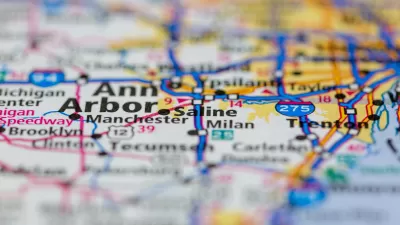A pilot program will use GPS-enabled devices to track driving habits, allowing cities to use the data to create road pricing fee structures based on hyper-local and individual driving needs.

Utah announced a pilot program that could lead to “hyper-specific” road usage fees based on drivers’ specific driving habits and needs.
The program uses an electronic dongle to monitor exactly where, when, and how much people drive. “Then, communities can consolidate that data into a single road usage charge that can be automatically adjusted based on their unique priorities — think extra tolls for using the express lane, or graduated fees for low-income motorists who truly have to drive — and automatically distributed to the agencies that manage the exact roadways those drivers' actually traveled.”
The concept is one way to replace gas tax revenue that many states rely on heavily for transportation funding and that will rapidly shrink as electric vehicles become a larger share of the market. But it could face resistance from drivers with privacy concerns, Wilson notes. “Even if most U.S. drivers get past privacy concerns about equipping their vehicles with hyper-accurate GPS dongles and the dizzying network of high-tech eyes that are already watching them, they might fight back against being charged more for entering a busy downtown at rush hour, as New York City's long, messy congestion pricing fight has illustrated all too plainly.”
In the future, cities could use the technology to incentivize a reduction in driving or charge vehicles based on weight “to compensate for the extra damage they cause to roads (and the bodies of pedestrians they strike).”
FULL STORY: Utah’s ‘Road Usage Charging’ Pilot Could Finally Price the Roads Properly

Alabama: Trump Terminates Settlements for Black Communities Harmed By Raw Sewage
Trump deemed the landmark civil rights agreement “illegal DEI and environmental justice policy.”

Planetizen Federal Action Tracker
A weekly monitor of how Trump’s orders and actions are impacting planners and planning in America.

How Atlanta Built 7,000 Housing Units in 3 Years
The city’s comprehensive, neighborhood-focused housing strategy focuses on identifying properties and land that can be repurposed for housing and encouraging development in underserved neighborhoods.

In Both Crashes and Crime, Public Transportation is Far Safer than Driving
Contrary to popular assumptions, public transportation has far lower crash and crime rates than automobile travel. For safer communities, improve and encourage transit travel.

Report: Zoning Reforms Should Complement Nashville’s Ambitious Transit Plan
Without reform, restrictive zoning codes will limit the impact of the city’s planned transit expansion and could exclude some of the residents who depend on transit the most.

Judge Orders Release of Frozen IRA, IIJA Funding
The decision is a victory for environmental groups who charged that freezing funds for critical infrastructure and disaster response programs caused “real and irreparable harm” to communities.
Urban Design for Planners 1: Software Tools
This six-course series explores essential urban design concepts using open source software and equips planners with the tools they need to participate fully in the urban design process.
Planning for Universal Design
Learn the tools for implementing Universal Design in planning regulations.
Caltrans
Smith Gee Studio
Institute for Housing and Urban Development Studies (IHS)
City of Grandview
Harvard GSD Executive Education
Toledo-Lucas County Plan Commissions
Salt Lake City
NYU Wagner Graduate School of Public Service




























